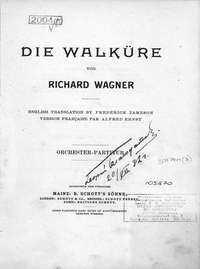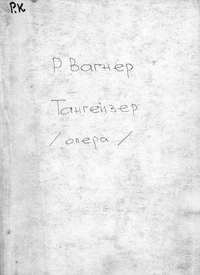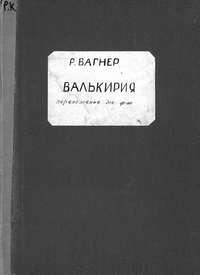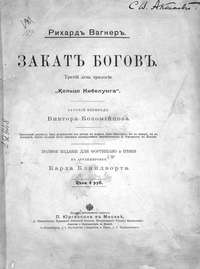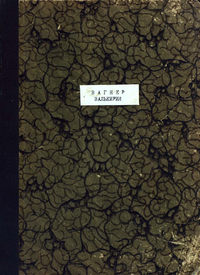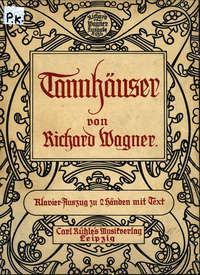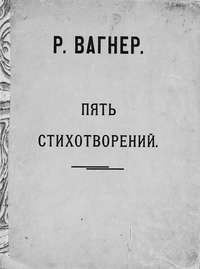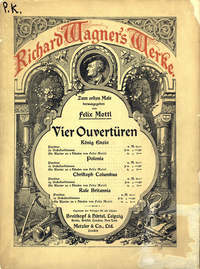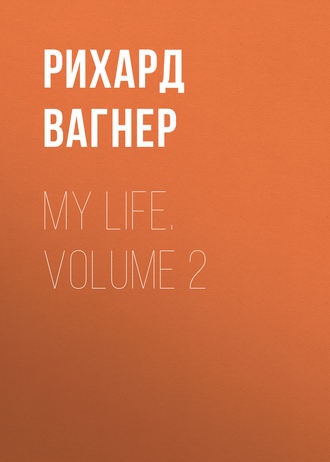 полная версия
полная версияMy Life. Volume 2
But soon it became clear to me that the political situation, which was putting Austrian Italy into a state of ferment, might develop into an occasion for renewing active precautionary measures against strangers. The outbreak of war with Piedmont and France became more and more imminent, and the evidence of deep agitation in the Italian population grew more unmistakable every moment. One day, when I was sauntering up and down the Riva with Tessarin, we came upon a fairly large crowd of strangers, who, with a mixture of respect and curiosity, were watching the Archduke Maximilian and his wife as they were taking the air during a short visit to Venice. The situation was rapidly conveyed to me by my Venetian pianist, who nudged me violently and sought to drag me away from the spot by my arm: in order that, as he explained, I might be spared the necessity of raising my hat to the Archduke. Seeing the stately and very attractive figure of the young Prince passing along, I slipped by my friend with a laugh, and took honest pleasure in being able by my greeting to thank him for his protection, although, of course, he did not know who I was.
Soon, however, everything began to assume a more serious aspect, and to look gloomy and depressing. Day by day the Riva was so crowded with troops newly disembarked, that it became quite unavailable for a promenade. The officers of these troops, on the whole, made a very favourable impression on me, and their homely German tongue, as they chatted harmlessly with one another, reminded me pleasantly of home. In the rank and file, on the other hand, I could not possibly feel any confidence, for in them I saw chiefly the dull servile features of certain leading Slav races in the Austrian monarchy. One could not fail to recognise in them a certain brute force, but it was no less clear that they were entirely devoid of that naive intelligence which is such an attractive characteristic of the Italian people. I could not but grudge the former race their victory over the latter. The facial expression of these troops recurred forcibly to my memory in the autumn of this year in Paris, when I could not avoid comparing the picked French troops, the Chasseurs de Vincennes and the Zouaves, with these Austrian soldiers; and without any scientific knowledge of strategy, I understood in a flash the battles of Magenta and Solferino. For the present I learned that Milan was already in a state of seige and was almost completely barred to foreigners. As I had determined to seek my summer refuge in Switzerland on the Lake of Lucerne, this news accelerated my departure; for I did not want to have my retreat cut off by the exigencies of war. So I packed up my things, sent the Erard once more over the Gotthard, and prepared to take leave of my few, acquaintances. Ritter had resolved to remain in Italy; he intended to go to Florence and Rome, whither Winterberger, with whom he had struck up a friendship, had hurried in advance. Winterberger declared that he was provided by a brother with money enough to enjoy Italy—an experience which he declared necessary for his recreation and recovery, from what disease I do not know. Ritter therefore counted upon leaving Venice within a very short time. My leave-taking with the worthy Dolgoroukow, whom I left in great suffering, was very sincere, and I embraced Karl at the station, probably for the last time, for from that moment I was left without any direct news of him, and have not seen him to this day.
On the 24th of March, after some adventures caused by the military control of strangers, I reached Milan, where I allowed myself to stay three days to see the sights. Without any official guide to help me, I contented myself with following up the simplest directions I could obtain to the Brera, the Ambrosian Library, the 'Last Supper' of Leonardo da Vinci, and the cathedral. I climbed the various roofs and towers of this cathedral at all points. Finding, as I always did, that my first impressions were the liveliest, I confined my attention in the Brera chiefly to two pictures which confronted me as soon as I entered; they were Van Dyck's 'Saint Anthony before the Infant Jesus' and Crespi's 'Martyrdom of Saint Stephen.' I realised on this occasion that I was not a good judge of pictures, because when once the subject has made a clear and sympathetic appeal to me, it settles my view, and nothing else counts. A strange light, however, was shed on the effect made by the purely artistic significance of a masterpiece, when I stood before Leonardo da Vinci's 'Last Supper' and had the same experience as every one else. This work of art, although it is almost entirely destroyed as a picture, produces such an extraordinary effect on the mind of the spectator, that even after a close examination of the copies hanging beside it representing it in a restored state, when he turns to the ruined picture the fact is suddenly revealed to the eye of his soul that the contents of the original are absolutely inimitable. In the evening I made all haste to get to the Italian comedy again. I grew very fond of it, and found it had installed itself here in the tiny Teatro Re for the benefit of a small audience of the lower orders. The Italians of to-day unfortunately despise it heartily. Here, too, the comedies of Goldoni were played with, as it seemed to me, considerable and ingenious skill. On the other hand, it was my fate to be present at a performance in the Scala Theatre, where, in a setting of an external magnificence that was extraordinary, it was proved true that Italian taste was degenerating sadly. Before the most brilliant and enthusiastic audience one could wish for, gathered together in that immense theatre, an incredibly worthless fake of an opera by a modern composer, whose name I have forgotten, was performed. The same evening I learned, however, that although the Italian public was passionately fond of song, it was the ballet which they regarded as the main item; for, obviously, the dreary opera, at the beginning was only intended to prepare the way for a groat choreographic performance on a subject no less pretentious than that of Antony and Cleopatra. In this ballet I saw even the cold politician Octavianus, who until now had not so far lost his dignity as to appear as a character in any Italian opera, acting in pantomime and contriving fairly successfully to maintain an attitude of diplomatic reserve. The climax, however, was reached in the scene of Cleopatra's funeral. This afforded the immense staff of the ballet an opportunity for displaying the most varied picturesque effects in highly characteristic costumes.
After receiving these impressions all by myself, I travelled to Lucerne one brilliant spring day by way of Como, where everything was in full blossom, through Lugano, which I knew already, and the Gotthard, which I had to cross in small open sledges along towering walls of snow. When I reached Lucerne the weather was bitterly cold, in contrast with the genial spring I had enjoyed in Italy. The allowance of money I had made for my stay in Lucerne was based on the assumption that the big Hotel Schweizerhof was quite empty from about this time until the summer season began, and that without further preliminaries I should be able to find a lodging there both spacious and free from noise. This hope had not been entertained in vain. The courteous manager of the hotel, Colonel Segesser, allotted to me a whole floor in the annexe on the left, to occupy at my pleasure. I could make myself quite comfortable here in the larger rooms at a moderate price. As the hotel at this time of the year had only a very small staff of servants, it was left to me to make arrangements for some one to wait upon me. For this purpose I found a careful woman well suited to look after my comfort. Many years afterwards, remembering the good services she had rendered me, especially later on when the number of guests had increased, I engaged her as my housekeeper.
Soon my things arrived from Venice. The Erard had been obliged to cross the Alps again when the snow was on the ground. When it was set up in my spacious drawing-room, I said to myself that all this trouble and expense had been incurred to enable me at last to complete the third act of Tristan und Isolde. There were times when this seemed to me to be an extravagant ambition; for the difficulties in the way of finishing my work seemed to make it impossible. I compared myself to Leto who, in order to find a place in which to give birth to Apollo and Artemis, was hunted about the world and could find no resting-place until Poseidon, taking compassion on her, caused the island of Delos to rise from the sea.
I wished to regard Lucerne as this Delos. But the terrible influence of the weather, which was intensely cold and continuously wet, weighed upon my spirits in a most unfriendly fashion until the end of May. As such great sacrifice had been made to find this new place of refuge, I thought every day had been uselessly frittered away which had not contributed something to my work of composing. For the greater part of my third act I was occupied with a subject sad beyond words; it came to such a pass that it is only with a shudder that I can recall the first few months of this emigration to Lucerne.
A few days after my arrival I had already visited the Wesendoncks in Zurich. Our meeting was melancholy, but in no way embarrassed. I spent some days in my friends' house, where I saw my old Zurich acquaintances again, and felt as though I were passing from one dream to another. In fact, everything assumed an air of unsubstantiality for me. Several times in the course of my stay in Lucerne I repeated this visit, which was twice returned to me, once on the occasion of my birthday.
Besides the work on which I was now somewhat gloriously engaged, I was also heavy with cares about keeping myself and my wife alive. Of my own accord and out of necessary respect for the circumstances in which my friends the Ritters were placed, I had already in Venice felt myself for the future obliged to decline their voluntary support. I was beginning to exhaust the little that I could contrive to extract with difficulty from those of my operas which up to this period it had been possible to produce. It was settled that I should take up the Nibelungen work when Tristan was finished, and I thought it my duty to find out some way of making my future existence easier. This Nibelungen work spurred me to the attempt. The Grand Duke of Weimar still kept up his interest in it, to judge from the communications I had received from him during the previous year. I therefore wrote to Liszt and repeated my request that he would make a serious proposal to the Grand Duke to buy the copyright of the work and arrange for its publication, with the right of disposing of it to a publisher on his own terms. I enclosed my former negotiations with Hartel, which had been broken off, and which were now intended to serve as a fair basis for what may be called the business arrangement that Liszt was to enter into with the Grand Duke. Liszt soon gave me an embarrassed hint that his Royal Highness was not really keen on it. This was quite enough for me.
On the other hand, I was driven by circumstances to come to an agreement with Meser in Dresden about the unfortunate copyright of my three earlier operas. The actor Kriete, one of my principal creditors, was making piteous demands for the return of his capital. Schmidt, a Dresden lawyer, offered to put the matter right, and after a long and heated correspondence it was arranged that a certain H. Muller, successor to Meser, who had died a short time before, should enter into possession of the copyright of these publications. On this occasion I heard of nothing but of the costs and expenditure to which my former agent had been put; but it was impossible to get any clear account of the receipts he had taken from my works beyond the fact that the lawyer admitted to me that the late Meser must have put aside some thousands of thalers, which, however, it would not be possible to lay hands on, as he had not left his heirs any funds at all.
In order to pacify the woeful Kriete, I was eventually obliged to agree to sell my rights in the works Meser had published for nine thousand marks, which represented the exact sum I owed to Kriete and another creditor who held a smaller share. With regard to the arrears of interest still owing on the money at compound rate, I remained Kriete's personal debtor; the joint sum amounted in the year 1864 to five thousand four hundred marks, which were duly claimed of me about this time with all the pressure of the law. In the interests of Pusinelli, my chief creditor, who could only be provided under this arrangement with inadequate payment, I reserved to myself the French copyright of these three operas, in the event of this music being produced in France through my efforts at finding a publisher to purchase it in that country.
According to the contents of a letter from the lawyer Schmidt, this reservation of mine had been accepted by the present publisher in Dresden. Pusinelli in a friendly spirit forbore to take advantage of the benefits accruing to him from this arrangement, in regard to the capital he had formerly lent me. He assured me he would never claim it. Thus one possibility remained open to me for the future: that if my operas could make their way into France, although there would be no question of any profit coming to me through those works of mine, I should be reimbursed for the capital I had spent on them and for that which I had been obliged to guarantee. When, later on, my Paris publisher Flaxland and I came to make out an agreement, Meser's successor in Dresden announced himself as absolute proprietor of my operas, and actually succeeded in putting so many obstacles in Flaxland's way in the conduct of his French business, that the latter was compelled to purchase peace at the price of six thousand francs. The natural result of this was that Flaxland was placed in the position of being able to deny that it was I who owned the French copyright of my work. Upon this I made repeated appeals to Adolph Schmidt, the lawyer, to give evidence in my favour, asking nothing more of him than that he should forward to me a copy of the correspondence referring to the rights I had reserved, which had become valid in the Lucerne transaction. To all the letters addressed to him on this subject, however, he obstinately refused an answer, and I learned later on from a Viennese lawyer that I must give up hoping to get this kind of evidence, as I had no legal means in my possession to force the advocate to give it, if he were not so inclined.
While, owing to this, I had little opportunity of improving my prospects for the future, I had at least the satisfaction of seeing the score of Tannhauser engraved at last. As the stock of my earlier autograph copies had come to an end, chiefly through the wasteful management of Meser, I had already persuaded Hartel when I was in Venice to have the score engraved. Meser's successor had acquired the complete rights of this work, and therefore regarded it as a point of honour not to give up the score to another publisher; consequently he took over the task of producing it at his own cost. Unluckily fate demanded that just a year later I had to revise and reconstruct the first two scenes completely. To this day it is a subject of regret to me not to have been able to introduce this fresh piece of work into the engraved score.
The Hartels, never faltering in their assumption that Tristan might provide good food for the theatre, set their men busily to work upon engraving the score of the second act, while I was at work on the third. The process of registering corrections, while I was in the throes of composing the third act—one long ecstasy—wielded over me a strange, almost uncanny influence; for in the first scenes of this act it was made clear to me that in this opera (which had been most unwarrantably assumed to be an easy one to produce), I had embodied the most daring and most exotic conception in all my writings. While I was at work on the great scene of Tristan, found myself often asking whether I was not mad to want to give such work to a publisher to print for the theatre. And yet I could not have parted with a single accent in that tale of pain, although the whole thing tortured me to the last degree.
I tried to overcome my gastric troubles by using (among other things) Kissingen water in moderate doses. As I was fatigued and made incapable of work by the early walks I had to take during this treatment, it occurred to me to take a short ride instead. For this purpose the hotel manager lent me a horse, aged twenty-five, named Lise. On this animal I rode every morning as long as it would carry me. It never conveyed me very far, but turned back regularly at certain spots without taking the slightest notice of my directions.
Thus passed the months of April, May, and the greater part of June, without my completing even half of my composition for the third act, and all the while I was contending with a mood of the deepest melancholy. At last came the season for the visitors to arrive; the hotel with its annexes began to fill, and it was no longer possible to think of maintaining my exceptional privilege with regard to the use of such choice quarters. It was proposed to move me to the second storey of the main building, where only travellers who spent the night on their way to other places in Switzerland were put up, whereas in the annexes people were lodged who came to make a long stay, and who used their rooms day and night. As a matter of fact, this arrangement answered admirably. From this time forward I was completely undisturbed during the hours of my work in my little sitting-room with its adjoining bedchamber, as the rooms engaged for the night by strangers in this storey were perfectly empty in the daytime.
Really splendid summer weather set in eventually, lasting a good two months with a continuously cloudless sky. I enjoyed the curious charm of protecting myself against the extremes of the sun's heat by carefully keeping my room cool and dark, and going out on to my balcony only in the evening to surrender myself to the influence of the summer air. Two good horn-players gave me great pleasure by providing a performance of simple folk-songs almost regularly in a skiff on the lake. In my work, too, I had now luckily passed the critical point, and in spite of its sorrowful character, the more subdued mood of that part of my poem which I had still to master, threw me into a sincere spiritual ecstasy, during which I completed the composition of the whole work by the beginning of August, fragments only remaining to be orchestrated.
Lonely as was my life, the exciting events of the Italian war provided me plenty of interest. I followed this struggle, as unexpected as it was significant, through the thrilling course of its successes and reverses. Still I did not remain entirely without company. In July, Felix Drasecke, whom I had not known before, came to Lucerne for a lengthy visit. After hearing a performance of the prelude to Tristan und Isolde conducted by Liszt, he had almost immediately determined to make himself personally acquainted with me. I was completely terrified by his arrival, and was at a loss to know what to do with him. Moreover, as his talk was in a certain facetious vein, overflowing with stories of persons and circumstances for which I was gradually losing all appreciation, he soon began to bore me, a fact which astonished him, and which he recognised so clearly that he thought he had better leave after a few days. This made me in my turn embarrassed, and I now took special care to deprive him of the bad opinion he had formed of me. I soon learned to like him, and for a considerable time, until shortly before his departure from Lucerne, he was my daily companion, from whose intercourse I derived much pleasure, as he was a highly gifted musician and by no means a prig. But Drasecke was not my only visitor.
Wilhelm Baumgartner, my old Zurich acquaintance, came to spend a few weeks in Lucerne out of kindness to me. And lastly Alexander Seroff from St. Petersburg came to stay some time in the neighbourhood. He was a remarkable man, of great intelligence, and openly prepossessed in favour of Liszt and myself. He had heard my Lohengrin in Dresden and wanted to know more of me—an ambition I was obliged to satisfy by playing Tristan to him in the rough-and-ready fashion which was peculiar to me. I went up Mount Pilatus with Drasecke, and again had to look after a companion who suffered from giddiness. To celebrate his departure I invited him to take an excursion to Brunnen and the Grutli. After this we took leave of each other for the time being, as his moderate resources did not permit him to remain any longer, and I too was seriously thinking of taking my departure.
The question now arose as to where I was to go. I had addressed letters, first through Eduard Devrient, and finally direct to the Grand Duke of Baden, asking the latter for a guarantee that I might settle, if not in Karlsruhe itself, at least in some small place in the neighbourhood. This would suffice to set at rest a craving, which could no longer be suppressed, for intercourse now and then with an orchestra and a company of singers, if only to hear them play. I learned later that the Grand Duke had really bestirred himself in the matter by writing to the King of Saxony. But the view still prevailed in that quarter that I could not be granted an amnesty, but could only hope to receive an act of grace; it being assumed, of course, that I would first have to report myself to a magistrate for examination. Thus the fulfilment of my wish remained impossible, and I shrank in dismay before the problem of how to secure a performance of my Tristan which I could superintend in person, as I had determined to do. I was assured that the Grand Duke would know what measures to resort to in order to meet the situation. But the question was, where was I to turn for a place in which to settle with some prospect of being able to remain there. I longed for a permanent home again. After due consideration I decided that Paris was the only place where I could make sure of now and then hearing a good orchestra and a first-class quartette. Without these stimulating influences Zurich at last became unbearable, and in no other city but Paris, where I could stay undisturbed, could I safely reckon on being able to obtain artistic recreation of a sufficiently high standard.
At last I had to bestir myself to come to a decision about my wife. We had now been apart from each other for a whole year. After the hard lessons she had received from me, and which, according to her letters, had left a deep impression upon her, I was justified in assuming that the renewal of our life in common might be made tolerable; especially as it would remove the grave difficulty of her maintenance. I therefore agreed with her that she should join me late in the autumn in Paris. In the meantime I was willing to look for a possible abode there, and undertook to arrange for the removal of our furniture and household goods to the French capital. In order to carry out this plan financial assistance was imperative, as the means at my disposal were quite inadequate. I then made to Wesendonck the same offer in regard to my Nibelungen that I had made to the Grand Duke of Weimar, that is to say, I proposed that he should buy the copyright for publishing the work. Wesendonck acceded to my wishes without demur, and was ready to buy out each of the completed portions of my work in turn for about the same sum as it was reasonable to suppose a publisher would pay for it later on. I was not able to fix my departure, which took place on the 7th of September, when I went for a three days' visit to my friends in Zurich. I spent these days at the Wesendonck's, where I was well looked after and saw my former acquaintances, Herwegh, Semper, and Gottfried Keller. One of the evenings I spent with them was marked by an animated dispute with Semper over the political events of the time. Semper professed to recognise, in the recent defeat of Austria, the defeat of the German nationality; in the Romance element represented by Louis Napoleon, he recognised a sort of Assyrian despotism which he hated both in art and politics. He expressed himself with such emphasis that Keller, who was generally so silent, was provoked into a lively debate. Semper in his turn was so aggravated at this, that at last in a fit of desperation he blamed me for luring him into the enemy's camp, by being the cause of his invitation to the Wesendonck's. We made it up before we parted that night, and met again on several occasions after this, when we took care never again to let our discussions become so passionate. From Zurich I went to Winterthur to visit Sulzer. I did not see my friend himself, but only his wife and the boy she had borne to him since my last visit; the mother and child made a very touching and friendly impression on me, particularly when I realised that I must now regard my old friend in the light of a happy father.


